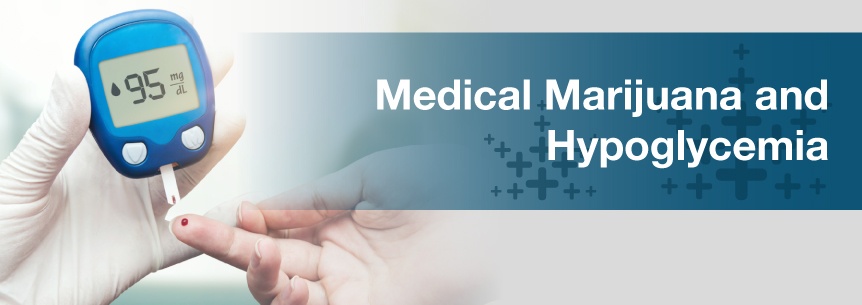
Those with hypoglycemia often struggle with unpleasant symptoms like fatigue, anxiety, and irritability. If left untreated, hypoglycemia can even cause seizures, unconsciousness or death. Hypoglycemia often links with diabetes treatment. Marijuana can help alleviate these and other symptoms directly related to this low-blood glucose condition. It can even help stabilize your blood sugar.
In various large population studies, researchers have noted lower rates of both diabetes and obesity among marijuana users, as compared with those who don’t use.
Researchers in studies found individuals currently using cannabis had:
In research studying CBD, the CBD helped prevent diabetes development in non-obese mice with diabetes. While there was not a direct effect of CBD on the levels of glucose, the treatment did prevent the production of IL-12 by splenocytes. It’s essential to avoid this cytokine because it plays a significant role in numerous autoimmune diseases.
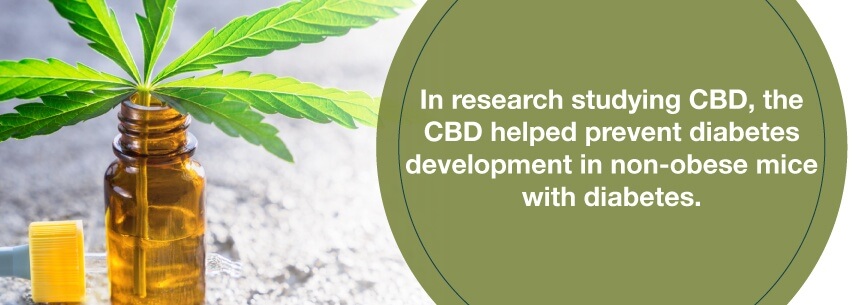
Several other studies found medical cannabis helps improve blood sugar control and with weight loss. The herb also appears to enhance the carbohydrate metabolism of a user.
Find A Doctor Find A Dispensary
Medical marijuana and hypoglycemia can help treat symptoms such as:
Some good strains for diabetes are:
Strains for insomnia include:
Strains for anxiety include:
Strains for depression include:
Strains for seizures include:
Strains low in THC and high in CBD seem to work well for treating seizures. You can experience CBD’s seizure-reducing effects without the psychoactive high. Charlotte’s Web appears to be the most effective strain for patients struggling with seizures.
The right cannabis consumption method for you will depend on your diagnosis, symptoms, and reaction to medical pot. There are a variety of delivery methods you can choose from, and each will impact how your cannabis treatment affects you. Some delivery methods include:
Because edibles take longer to feel the effects, you might be more inclined to vape your medical marijuana. You could experience side effects from medical marijuana ranging from dry mouth and red eyes to giddiness, panic attacks or drowsiness.
If you’re thinking about trying marijuana for hypoglycemia or diabetes, you can browse our extensive list of qualified marijuana doctors to help provide you with your recommendation and medical marijuana card. Our doctors are certified and experts in cannabis and know all the benefits of the herb.
They can help you come up with a treatment plan to relieve your hypoglycemia symptoms. Schedule an appointment and then take a look at our extensive dispensary list as well where you can purchase your medicine. Our experienced doctors will be happy to answer any questions you have.
Find A Doctor Find A Dispensary
Hypoglycemia is a condition where your blood sugar levels become too low. When your blood glucose levels are too low, your body doesn’t have enough energy to function correctly. Technically, hypoglycemia occurs when your blood sugar falls below 70 milligrams per deciliter (mg/dl). However, you are advised to determine with your doctor what level of blood glucose would be considered too low for you.
Hypoglycemia is the opposite of hyperglycemia, which is when there’s too much sugar in your blood.
Hypoglycemia may occur in individuals with diabetes when their body has too much insulin. Insulin is a hormone your pancreas produces so your body can break down sugar. Hypoglycemia can also occur in diabetics who take too much insulin.
While it often occurs in people with diabetes, it can also occur in those who don’t.
In those without diabetes, hypoglycemia can occur if their body can’t stabilize their blood sugar levels. It can also happen if your body makes too much insulin after meals. Hypoglycemia in those without diabetes isn’t as common as hypoglycemia in diabetics.
Your digestive system breaks your food’s carbohydrates down into various types of sugar molecules. Glucose is one of these sugar molecules and is your body’s primary source of energy.
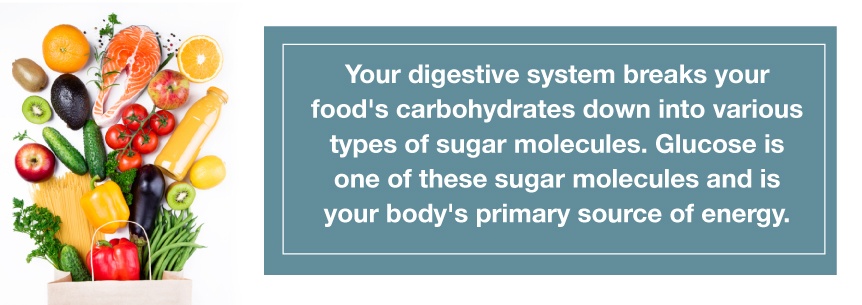
Glucose enters your bloodstream after you eat. It needs insulin, however, to enter a cell. If there wasn’t any insulin, a cell would starve, no matter how much glucose you had.
Your pancreas releases an accurate amount of insulin automatically after you eat to move the glucose in your blood into the cells, lowering your blood sugar level. Excess glucose goes to your muscles and liver in the form of stored glucose or glycogen.
Insulin brings extra blood sugar levels back to where they initially were.
If you haven’t eaten in a while and your levels of glucose drop, your pancreas will secrete another hormone, called glucagon, which triggers stored glycogen to break down into glucose. The glucose is then released into your bloodstream and brings your levels of glucose back up.
If your levels of blood sugar become too low, you may experience symptoms such as:
Severe hypoglycemia can cause severe cognitive impairment, which requires external help for recovery.
Some individuals experience no symptoms — a condition known as hypoglycemia unawareness.
Hypoglycemia can occur for various reasons. It can happen when diabetic patients take too much insulin. But it can also happen for non-diabetic reasons.
Individuals with type 1 diabetes don’t produce insulin. Individuals with type 2 diabetes have cells that don’t properly respond to insulin. Both are vulnerable to increased blood glucose levels, and their cells don’t get enough energy.
Individuals who have both diabetes types typically require insulin or other medication to lower their blood sugar levels. If they take too much insulin, it can cause their levels of blood sugar to drop significantly, causing hypoglycemia.
There are other reasons why hypoglycemia would occur such as:
There are several types of hypoglycemia, including:
Most individuals suffering from hypoglycemia have diabetes, probably caused by their body’s inability to control the insulin and glucose amounts properly in their body. In these situations, many times hypoglycemia is due to accidental miscalculations or improper use of medication dosages.
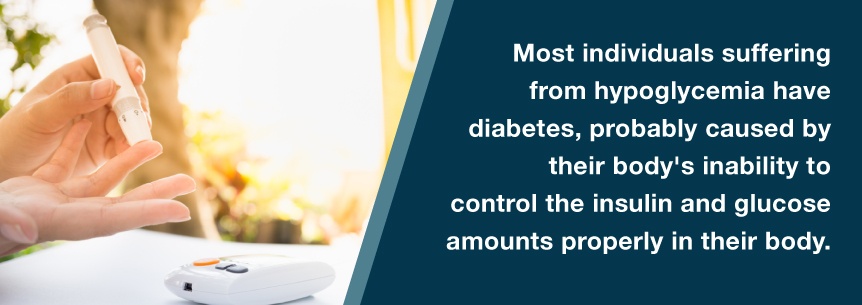
Different internal and external factors may trigger non-diabetic hypoglycemia. Two subtypes of non-diabetic hypoglycemia are reactive and fasting hypoglycemia, with both due to different causes.
If left untreated and hypoglycemia becomes worse, patients may suffer from symptoms such as:
Those with severe hypoglycemia might seem to be intoxicated. They might move clumsily or slur their words.
Hypoglycemia often accompanies poorly managed diabetes. If you ignore the signs of hypoglycemia, it can cause diabetes to become more severe.
Individuals who experience hypoglycemia regularly might become unaware it’s occurring. They won’t notice the signs, and this can result in serious and potentially fatal complications.
Many individuals struggling with depression are just struggling with low blood sugar. When there’s a drop in blood sugar levels, it elicits our brain’s stress response. For people predisposed to depression, anxiety or both, this could be the trigger of an episode.
Anxiety is closely interrelated with hypoglycemia. While these two are interrelated, an anxiety disorder can’t cause hypoglycemia. But, hypoglycemia can cause anxiety, and it’s essential to know the difference between a hypoglycemic attack or anxiety so you can receive treatment quickly.
Hypoglycemia facts according to the Centers for Disease Control and Prevention (CDC) include:
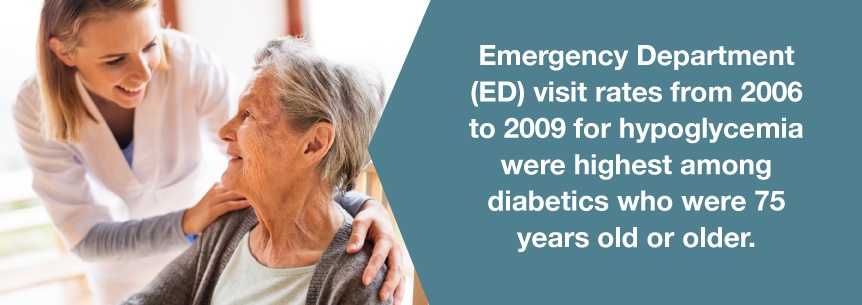
James Collip first discovered hypoglycemia when working with Frederick Banting in 1922 on purifying insulin. Collip was working on developing a test for measuring insulin activity. He injected the insulin first into a rabbit to measure the lowered blood glucose levels. The rabbits began convulsing when he injected too large of an insulin dose.
The rabbits also went into a coma and died. Because of this, he declared one insulin unit as being the amount necessary for inducing this hypoglycemia convulsing reaction and found they could save rabbits by injecting them with glucose when they began convulsing.
People with diabetes need to check their blood glucose levels and if hypoglycemic, treat their low blood sugar levels using one or more of the following methods. After treating their hypoglycemia, they should wait around 20 minutes and recheck their sugar levels.
If they still have low blood glucose levels, they should repeat the process — consume some glucose, wait around 20 minutes and recheck their glucose levels.
There are a couple of potential treatment options for hypoglycemia:
If an individual is experiencing severe symptoms and can’t treat themselves, someone else should apply jam, honey, treacle or Glucogel on the inside of their cheeks and massage the outside of their cheeks gently. The individual should start feeling better in around 20 minutes.
Diabetics should also maintain regular eating times to help keep their levels of blood glucose as stable as possible.
Finding and treating the underlying cause will offer a more long-term solution.
Various technologies and strategies are already available for detecting and preventing hypoglycemia, including:
Research has established the effectiveness of these techniques. However, further developments and advances are needed.
Today, there is technology to target hypoglycemia preemptively. A great deal of new “artificial pancreas” pump systems and current pumps already use these algorithms and can help doctors predict if an individual’s blood sugar will drop during the night or with exercise. In response to that, they can stop delivering insulin.
Collectively, more than 500 clinical trials have been conducted, are in progress or are in the recruiting stages for learning about hypoglycemia or evaluating its treatment options.